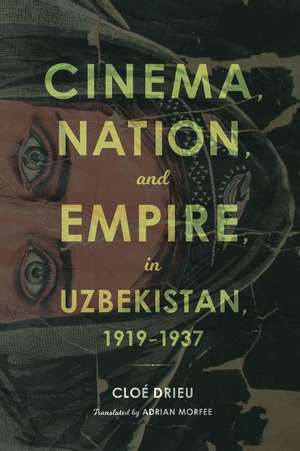Cinema, Nation, and Empire in Uzbekistan, 1919–1937
Autor Cloe Drieu, Adrian Morfee, Editions Kartha Editions Karthaen Limba Engleză Hardback – 31 dec 2018
Based on archival research in the Uzbek and Russian State Archives and on in-depth analyses of 14 feature-length films, Drieu's work examines the lively debates within the totalitarian and so-called revisionist schools that invigorated Soviet historiography, positioning itself within contemporary discussions about the processes of state- and nation-building, and the emergence of nationalism more generally. Revised and expanded from the original French, Cinema, Nation, and Empire in Uzbekistan helps us to understand how Central Asia, formerly part of the Russian Empire, was decolonized, but later, in the run-up to the Stalinist period and repression of the late 1930s, suffered a new style of domination.
| Toate formatele și edițiile | Preț | Express |
|---|---|---|
| Paperback (1) | 332.85 lei 6-8 săpt. | |
| MH – Indiana University Press – 31 dec 2018 | 332.85 lei 6-8 săpt. | |
| Hardback (1) | 591.32 lei 6-8 săpt. | |
| MH – Indiana University Press – 31 dec 2018 | 591.32 lei 6-8 săpt. |
Preț: 591.32 lei
Preț vechi: 767.95 lei
-23% Nou
Puncte Express: 887
Preț estimativ în valută:
113.15€ • 118.45$ • 93.62£
113.15€ • 118.45$ • 93.62£
Carte tipărită la comandă
Livrare economică 05-19 aprilie
Preluare comenzi: 021 569.72.76
Specificații
ISBN-13: 9780253037831
ISBN-10: 0253037832
Pagini: 312
Dimensiuni: 160 x 236 x 24 mm
Greutate: 0.59 kg
Editura: MH – Indiana University Press
ISBN-10: 0253037832
Pagini: 312
Dimensiuni: 160 x 236 x 24 mm
Greutate: 0.59 kg
Editura: MH – Indiana University Press
Cuprins
Note on Transcriptions
Prologue
Acknowledgements
Introduction
Part 1: Decolonizing Central Asia: Film Structures and Representations (1919-1927)
Turkestan Prior to the Birth of the USSR: Revolts and "Colonial Revolution"
1. Cultural Autonomy and the Nation (1919-1924)
2. Revolutionary Exoticism and the Colonial Imaginary-Cinema and Entertainment (1924-1927)
Part 2: Cultural Revolution and Its Paradoxes: Nation, Modernity, and Empire (1927-1931)<\>
"Cinematographic Cultural Revolution"
3. The National Cinematographic Sphere
4. Uzbek Film and the Shift Towards Imperial Domination
Part 3: The Paradoxes of the Nationalities Policy: Nationalism vs. Internationalism (1931-1937)
Working as an Uzbek Artist under Stalin: Ambivalence, Resistance, and Nationalism
5. The Nationalist Cinematographic Imaginary: Subjugating Class to Nation
6. The Empire of the Proletariat-Subjugating Nation to Class
Conclusion: Social Rank in the Neoliberal Era
Appendix
Glossary
Bibliography
Index
Prologue
Acknowledgements
Introduction
Part 1: Decolonizing Central Asia: Film Structures and Representations (1919-1927)
Turkestan Prior to the Birth of the USSR: Revolts and "Colonial Revolution"
1. Cultural Autonomy and the Nation (1919-1924)
2. Revolutionary Exoticism and the Colonial Imaginary-Cinema and Entertainment (1924-1927)
Part 2: Cultural Revolution and Its Paradoxes: Nation, Modernity, and Empire (1927-1931)<\>
"Cinematographic Cultural Revolution"
3. The National Cinematographic Sphere
4. Uzbek Film and the Shift Towards Imperial Domination
Part 3: The Paradoxes of the Nationalities Policy: Nationalism vs. Internationalism (1931-1937)
Working as an Uzbek Artist under Stalin: Ambivalence, Resistance, and Nationalism
5. The Nationalist Cinematographic Imaginary: Subjugating Class to Nation
6. The Empire of the Proletariat-Subjugating Nation to Class
Conclusion: Social Rank in the Neoliberal Era
Appendix
Glossary
Bibliography
Index
